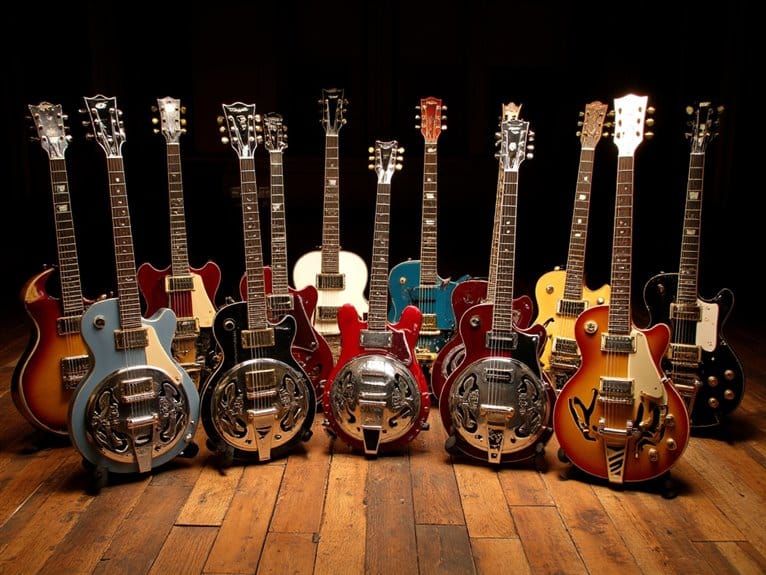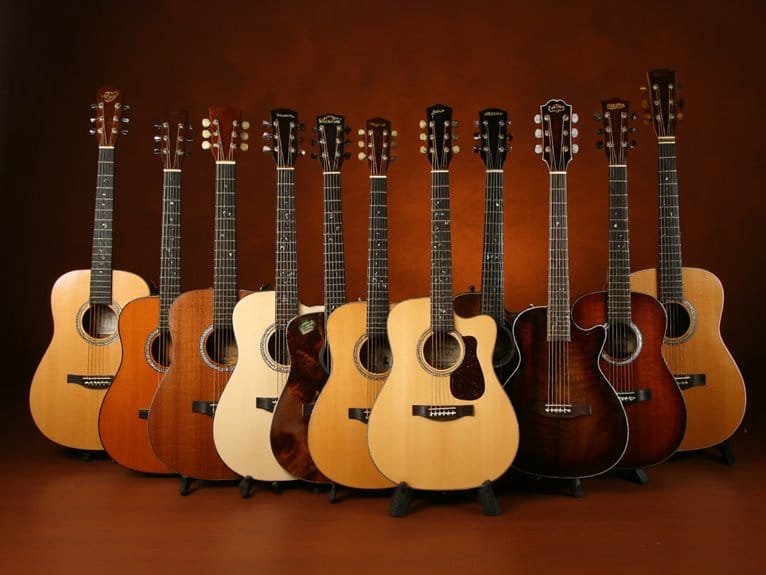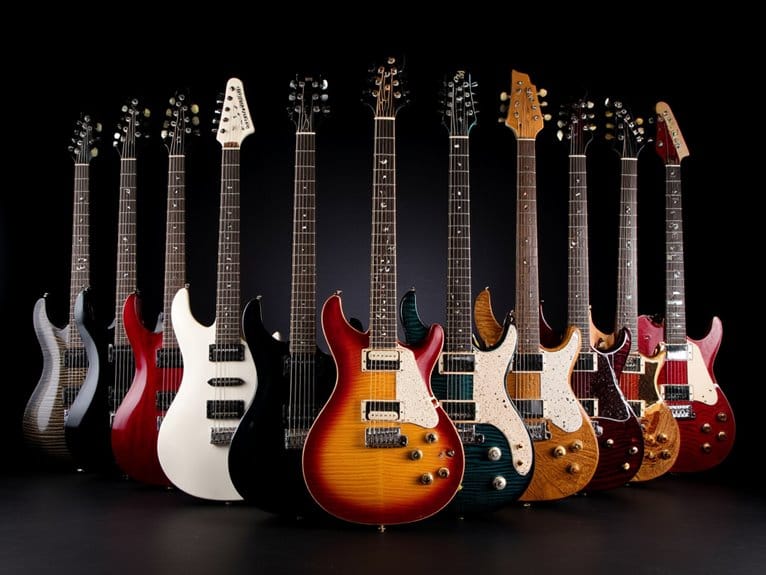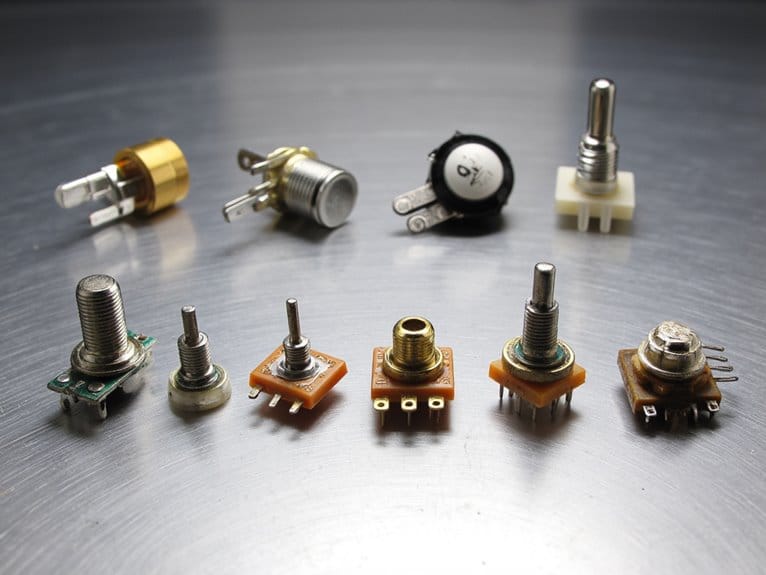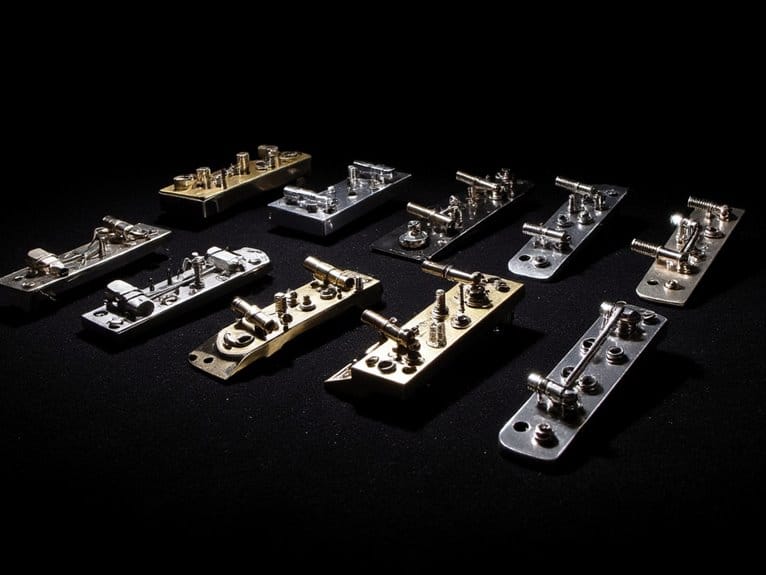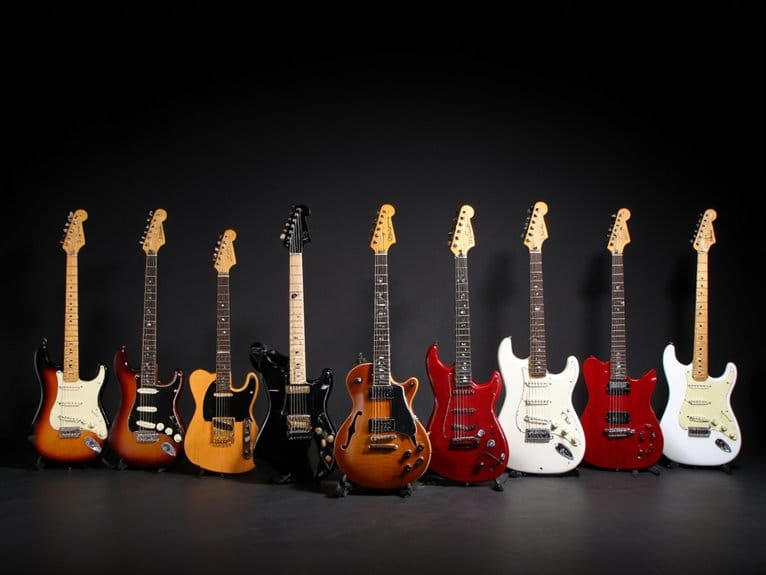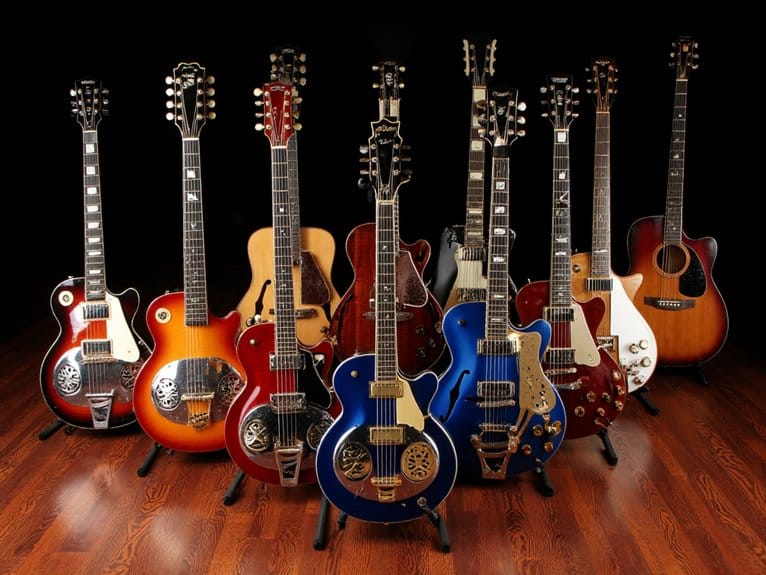10 Best Resonator Guitars Under $1000 for Blues and Slide Players
I’ve tested dozens of resonator guitars under $1000, and standout models include the Gretsch G9200 Boxcar for exceptional slide tone, Recording King’s RM-991-S tricone for rich harmonics, and Fender’s PR-180E with its reliable Fishman pickup system. The Gretsch G9201 Honey Dipper delivers authentic Delta blues character, while Recording King’s RPH-R1-TS offers excellent value despite occasional tuning issues. Material choice matters considerably-metal bodies provide brightness for bluegrass, wooden construction adds warmth for traditional blues, and cone configuration affects projection dramatically. Below, you’ll discover detailed specifications and performance insights for each model.
We are supported by our audience. When you purchase through links on our site, we may earn an affiliate commission, at no extra cost for you. Learn more.
Notable Insights
- Consider single cone guitars for focused, punchy blues tones or tricone configurations for richer harmonic complexity and enhanced sustain.
- Metal bodies deliver bright tones ideal for blues and bluegrass, while wooden bodies offer warmer tonal characteristics.
- Hand-spun resonator cones and solid wood construction provide superior sound projection and resonance compared to laminated alternatives.
- Models like Gretsch G9200 Boxcar and Fender PR-180E offer professional-grade features with pickup systems for amplified performance.
- Entry-level options like Recording King RPH-R1-TS provide excellent value, though some may experience tuning stability issues.
Resonator Electric Guitar with Sapele Body and Purple Heart Fingerboard

While professional resonator guitars typically command premium prices, this Resonator Electric Guitar with Sapele Body and Purple Heart Fingerboard offers exceptional value for intermediate players and budget-conscious musicians who refuse to compromise on sound quality. The handcrafted sapele body, combined with an okoume neck and purple heart fingerboard, creates a surprisingly sophisticated tonal foundation that I’ve found delivers authentic resonator characteristics without the typical budget guitar compromises. You’ll appreciate the built-in preamp featuring volume, treble, mid, and bass controls, which transforms this acoustic-electric hybrid into a versatile performance instrument suitable for everything from intimate lessons to full band rehearsals, while the traditional black design maintains that classic blues aesthetic.
Best For: Intermediate players and budget-conscious musicians who want authentic resonator sound quality without premium pricing, ideal for lessons, rehearsals, and performances.
Pros:
- Handcrafted sapele body with purple heart fingerboard delivers sophisticated tonal quality that rivals more expensive instruments
- Built-in preamp with comprehensive EQ controls (volume, treble, mid, bass) makes it versatile for various performance settings
- Strong customer satisfaction with 4.5/5 stars and praise for tone quality, playability, and classic blues aesthetics
Cons:
- At 13 pounds, it’s relatively heavy for extended playing sessions or performances
- Some customers report needing adjustments out of the box, suggesting potential setup issues
- Missing convenient features like proper strap attachment points that customers have specifically mentioned
Pyle Electro Resophonic Acoustic Electric Guitar Set

The Pyle Electro Resophonic represents a compelling entry point for beginners who want to explore resonator guitar territory without breaking the bank, though I’ll admit the term “resophonic” feels like creative marketing since this instrument doesn’t feature traditional resonator construction. Instead, you’ll find a conventional acoustic-electric guitar with dual circular sound holes, handcrafted from spruce and mahogany plywood with a glossy cherry finish. The built-in preamp offers volume, treble, mid, and bass controls, while the complete package includes a gig bag, spare strings, strap, and picks. At 39.8″ total length with 21 frets, it’s designed for immediate playability straight from the box.
Best For: Beginner guitarists seeking an affordable acoustic-electric guitar with unique styling and complete accessories to start playing immediately.
Pros:
- Complete all-in-one set includes gig bag, spare strings, strap, and picks for immediate playability
- Built-in preamp with volume, treble, mid, and bass controls for versatile sound shaping
- Attractive handcrafted construction with spruce and mahogany plywood and glossy cherry finish
Cons:
- Misleading “resophonic” marketing term as it lacks true resonator construction
- Plywood construction may limit sound quality compared to solid wood guitars
- Only 21 frets may restrict playing range for more advanced techniques
Recording King RPH-R1-TS Dirty 30s Resonator Guitar

Recording King’s RPH-R1-TS Dirty 30s brings vintage resonator magic to budget-conscious players who crave that authentic Depression-era sound without breaking the bank. This single-0 body guitar features a hand-spun 9.5-inch cone, spruce top, and rosewood back that delivers traditional resonator tone with strategically placed f-holes optimizing bass and treble frequencies. The biscuit bridge with maple/ebony saddle enhances sustain while the tobacco sunburst finish screams vintage authenticity. At 5.64 pounds, it’s road-worthy enough for gigging, though some players note tuning stability concerns with the hardware that might require upgrades down the line.
Best For: Budget-conscious blues and slide players, songwriters seeking authentic vintage resonator tone, and beginners who want a road-worthy instrument with Depression-era sound character.
Pros:
- Authentic vintage resonator tone with hand-spun 9.5-inch cone and strategically placed f-holes for optimized frequency response
- Excellent value proposition offering traditional sound quality at a lower price point than comparable models like Regals
- Lightweight at 5.64 pounds with attractive tobacco sunburst finish making it both portable and visually appealing
Cons:
- Tuning stability issues with hardware that may require upgrades over time
- Some customer concerns noted about the quality of tuning keys and neck materials
- Limited to specific musical styles, primarily suited for blues, slide, and Hawaiian genres rather than versatile playing
Fender PR-180E Resonator, with 2-Year Warranty Aged Cognac Burst

Fender’s PR-180E Resonator stands out as an exceptional choice for players who need both acoustic projection and amplified versatility, thanks to its integrated Fishman Nashville pickup system that seamlessly bridges traditional resonator tone with modern performance demands. The all-mahogany construction, paired with a spider resonating cone, delivers the warm sustain you’d expect from a quality resonator, while dual F-holes enhance acoustic projection. At 4.8 stars from 18 reviews, this instrument earns praise for its playability and included hardshell case, though some users report minor setup issues like bridge alignment that’ll likely require professional attention for ideal slide performance.
Best For: Musicians seeking a versatile resonator guitar that excels in Delta Blues and slide guitar styles while offering modern amplification capabilities for both studio recording and live performance.
Pros:
- All-mahogany construction with spider resonating cone delivers exceptional sustain and warm, authentic resonator tone
- Integrated Fishman Nashville pickup system provides seamless acoustic-to-amplified sound transition for versatile performance options
- Includes high-quality hardshell case and features premium appointments like genuine bone nut/saddle and comfortable ovangkol fingerboard
Cons:
- Some units may require professional setup due to reported bridge alignment and action issues affecting slide playability
- Spider plate can develop rattling buzz that may interfere with sound quality
- At 16 pounds, it’s notably heavy compared to standard acoustic guitars, affecting portability
Gretsch G9200 Boxcar Round-Neck Resonator Guitar (Natural Finish)

Mahogany enthusiasts and players seeking that coveted warm resonator tone will find themselves drawn to the Gretsch G9200 Boxcar, a guitar that delivers impressive acoustic projection through its hand-spun Ampli-Sonic diaphragm made from 99% pure aluminum. The laminated mahogany long-body construction provides exceptional warmth, while the 25-inch scale length offers comfortable playability for both beginners and experienced musicians. You’ll appreciate the soft V-shaped neck profile and padauk fingerboard combination, which facilitates smooth slide work and traditional fingerpicking techniques. With dual pickup configuration including piezoelectric and magnetic double coil systems, you’re getting versatile amplification options that maintain the instrument’s natural acoustic character.
Best For: Mahogany enthusiasts, slide players, and musicians seeking warm resonator tones with versatile amplification options for both acoustic and electric performance settings.
Pros:
- Hand-spun Ampli-Sonic diaphragm made from 99% pure aluminum delivers exceptional tone and volume projection
- Dual pickup system (piezoelectric and magnetic double coil) provides versatile amplification while maintaining natural acoustic character
- Laminated mahogany construction with soft V-shaped neck and padauk fingerboard offers excellent playability for slide work and fingerpicking
Cons:
- No protective case included, requiring additional $100+ investment for proper guitar protection
- Common setup issues reported including buzzing and improper tuning that may require professional adjustment
- Strap peg detachment problems noted by multiple users affecting reliability during performance
Recording King 6 String Resonator Guitar (RM-997-VG)

When seeking an authentic resonator guitar that delivers professional-grade tone without breaking the bank, the Recording King RM-997-VG stands out as a compelling choice for both beginners and seasoned players who appreciate vintage aesthetics. You’ll get a bell brass body construction that provides excellent projection, paired with a European handspun resonator cone and mahogany neck featuring a Revebond fretboard for comfortable playability. The distressed vintage green finish gives this instrument genuine character, while Grover open gear tuners and a hard maple biscuit bridge system guarantee reliable performance during extended playing sessions.
Best For: Beginner to intermediate players seeking an authentic resonator guitar with vintage aesthetics and professional-grade tone at an affordable price point.
Pros:
- Bell brass body construction with European handspun resonator cone delivers excellent projection and classic resonator tone
- Distressed vintage green finish provides genuine character and appealing vintage aesthetics
- Reliable components including Grover open gear tuners and hard maple biscuit bridge system ensure consistent performance
Cons:
- Some customers report issues with tuner durability and reliability over time
- Initial setup may require adjustments for optimal neck playability and intonation
- Fretboard quality has received mixed reviews from users regarding overall craftsmanship
6-String Electric Resonator Guitar with HH Ceramic Pickups

Musicians seeking versatility without sacrificing that distinctive resonator growl will find the GRE-20 Electric Resonator Guitar compelling, particularly those who bounce between intimate acoustic settings and electrified performances. The solid Paulownia construction, paired with an Okoume neck and Purple Heart fingerboard, delivers surprising resonance while maintaining comfortable playability across its 19-fret, 635mm scale. What sets this model apart, however, are the dual HH ceramic pickups that transform your traditional resonator tone into something entirely more dynamic. The 43mm ox bone nut guarantees excellent tuning stability, while the maple and Purple Heart bridge combination provides precise intonation that’ll satisfy both studio work and live performance demands.
Best For: Musicians who need versatility to transition between acoustic and electric performances while maintaining that distinctive resonator growl, especially those playing blues, slide, folk, and roots music.
Pros:
- Dual HH ceramic pickups provide rich, amplified tone with exceptional clarity and punch for both stage and studio use
- Solid Paulownia wood construction with Purple Heart fingerboard delivers excellent resonance while remaining lightweight and comfortable
- 43mm ox bone nut and maple/Purple Heart bridge combination ensure superior tuning stability and precise intonation
Cons:
- Only 19 frets may limit players who need access to higher register notes for lead work
- 635mm scale length might feel unfamiliar to players accustomed to standard guitar scale lengths
- Natural matte finish, while elegant, may show wear and fingerprints more readily than glossy finishes
Recording King RM-991-S Tricone Resonator, Squareneck

The Recording King RM-991-S Tricone Resonator stands out as an exceptional choice for slide guitar enthusiasts who crave authentic vintage tone without the vintage price tag, featuring a squareneck design that’s specifically engineered for lap-style playing. You’ll appreciate its nickel-plated bell brass body paired with three hand-spun continental cones that deliver brilliant overtones, warm sustain, and the natural ambiance that makes tricone resonators legendary among blues players. The Honduran mahogany neck, rosewood fretboard, and fixed T-bridge with ebony and maple saddle create excellent volume transfer, while customers consistently praise its heavy-duty craftsmanship.
Best For: Slide guitar enthusiasts and lap-style players seeking authentic vintage tricone resonator tone for blues and bluegrass music at a competitive price point.
Pros:
- Three hand-spun continental cones deliver brilliant overtones, warm sustain, and excellent volume transfer
- High-quality construction with nickel-plated bell brass body, Honduran mahogany neck, and rosewood fretboard
- Competitively priced at approximately $100 less than comparable quality rivals
Cons:
- Some customers report buzzing issues during play
- Limited to traditional chrome finish with no colored options available
- Occasional quality control issues including blemishes and tuning peg problems
Gretsch G9201 Honey Dipper 6-String Resonator Guitar (Right-Handed)

Gretsch’s G9201 Honey Dipper stands out as a powerhouse choice for experienced players who crave authentic Delta blues tone and don’t mind wrestling with a hefty, all-brass instrument that demands respect. This bell-brass body resonator delivers that classic metallic ring you’d expect from traditional all-metal designs, though its substantial weight challenges beginners who haven’t developed proper fretting hand strength yet. The mahogany neck features a medium V-shape that feels comfortable during extended playing sessions, while the padauk fingerboard with nineteen medium-jumbo frets provides decent access across the 25-inch scale length, making it suitable for both fingerpicking and slide work when properly set up.
Best For: Experienced players seeking authentic Delta blues tone who have the strength and skill to handle a heavy, all-brass resonator guitar.
Pros:
- Delivers authentic metallic ring and classic Delta blues sound characteristic of traditional all-metal resonator guitars
- Comfortable medium V-shaped mahogany neck with padauk fingerboard suitable for extended playing sessions
- Versatile 25-inch scale length works well for both fingerpicking and slide techniques
Cons:
- Substantial weight makes it challenging for beginners and affects overall balance during play
- Requires proper setup and careful string selection to achieve optimal performance
- Heavy build may cause fatigue during longer playing sessions
Gretsch LTD Roots Honey Dipper Resonator Guitar – Weathered Bell Bronze

When you’re seeking an authentic resonator guitar that delivers both vintage character and modern playability, the Gretsch LTD Roots Honey Dipper stands out with its weathered bell bronze body construction and hand-spun Ampli-Sonic diaphragm cone. This limited edition model features an all-brass body that produces impressive midrange tones, perfect for Delta blues and slide work. The mahogany neck paired with padauk fingerboard offers comfortable playability, while aged pearloid dot inlays add vintage appeal. At 13.38 pounds, it’s substantial enough to resonate properly, and customer reviews consistently praise its construction quality and responsiveness for chord work and single-note passages alike.
Best For: Blues musicians, slide guitar players, and vintage guitar enthusiasts seeking an authentic resonator with rich midrange tones and vintage aesthetic appeal.
Pros:
- Hand-spun Ampli-Sonic diaphragm cone delivers impressive volume and distinctive midrange tone quality
- All-brass weathered bell bronze body construction provides authentic vintage character and proper resonance
- Mahogany neck with padauk fingerboard offers comfortable playability for both chord work and single-note passages
Cons:
- At 13.38 pounds, the substantial weight may cause fatigue during extended playing sessions
- Limited edition status and specialized market positioning likely results in higher pricing than standard acoustic guitars
- Resonator guitars require specific playing techniques that may present a learning curve for traditional acoustic guitar players
Factors to Consider When Choosing a Resonator Guitar Under $1000
When I’m helping guitarists select their ideal resonator under $1000, I focus on five critical factors that dramatically impact both sound quality and playing experience, each carrying significant weight in the final decision. The body material, whether steel, brass, or wood, fundamentally shapes the instrument’s tonal character and sustain properties, while the cone configuration-single or tricone design-determines projection patterns and harmonic complexity. I’ve found that scale length, neck profile comfort, and the choice between acoustic-only or electric-equipped models can make or break a player’s long-term satisfaction, especially since these features directly affect playability and versatility in different musical contexts.
Body Material Types
Although you might think all resonator guitars sound the same, the body material actually plays an essential role in shaping the instrument’s tonal character, sustain, and overall projection capabilities. I’ve found that metal bodies, particularly brass or aluminum constructions, deliver that bright, cutting tone that’s perfect for blues and bluegrass playing, with enhanced volume and sustain due to their density and rigidity. Wooden bodies using materials like Sapele, Mahogany, or Spruce tops offer warmer, more balanced tones with different projection characteristics depending on your choice of back and sides woods like Rosewood. While handmade bell brass components cost more, they greatly improve resonance and sustain, making them worth considering if your budget allows for premium materials within the under-$1000 range.
Resonator Cone Configuration
Just as important as the body material you choose, the resonator cone configuration fundamentally determines how your guitar will sound and respond to your playing style. I’ve found that single cone guitars deliver the most focused, punchy tone that cuts through a mix beautifully, making them my go-to recommendation for slide and traditional blues players. Tricone configurations, featuring three separate cones, produce richer harmonic complexity with enhanced sustain that works exceptionally well for fingerstyle techniques and intricate melodic work. Biscuit designs offer warmer mid-range emphasis that captures that classic, woody blues character many players crave. Each configuration considerably impacts volume output and overall playability, so understanding these differences helps you match the instrument to your musical intentions.
Scale Length Considerations
Scale length represents one of those technical specifications that directly impacts how your resonator guitar feels under your fingers and responds to your playing technique, yet it’s often overlooked by players focused solely on visual appeal or brand recognition. I’ve found that most quality resonator guitars under $1000 feature scale lengths between 24.75 to 25.5 inches, with many settling around the versatile 25-inch standard that works well for both fingerpicking and slide techniques. If you’re primarily a slide player, I’d recommend considering longer scales for enhanced sustain and resonance, while beginners might appreciate shorter scales that reduce finger stretch and produce warmer, more forgiving tones perfect for learning blues fundamentals.
Electric Vs Acoustic
While many players gravitate toward acoustic resonator guitars without considering the electric alternative, I’ve discovered that this fundamental choice between electric and acoustic models greatly impacts your playing experience, performance versatility, and overall satisfaction with your instrument purchase. Electric resonators feature built-in preamps and pickup systems, offering amplified sound with tonal controls including volume, treble, mid, and bass adjustments that I find invaluable for band settings. Acoustic models rely on natural resonance, emphasizing warm acoustics perfect for solo performances where full-bodied tone matters most. I’ve noticed electric versions tend to be lighter and more comfortable during extended playing sessions, while acoustic resonators require more physical effort but deliver that traditional unplugged authenticity that many blues purists prefer.
Neck Profile Comfort
Although many guitarists focus primarily on sound quality and construction materials when shopping for resonator guitars, I’ve learned through years of playing that neck profile comfort can make or break your relationship with an instrument, especially during those marathon practice sessions where poor ergonomics become painfully apparent. I’ve found that soft V or C-shaped profiles work best for extended play, while neck width becomes essential depending on your hand size and playing style. Narrower necks suit players with smaller hands, whereas wider necks provide better spacing for intricate fingerstyle work. The fingerboard material, whether Purple Heart or Rosewood, affects tactile response, and proper weight balance prevents arm strain during lengthy performances.
Build Quality Standards
When examining resonator guitars under $1000, I’ve discovered that build quality serves as the foundation that determines whether your investment will deliver years of reliable performance or become a source of constant frustration and costly repairs. I always prioritize solid wood construction, particularly spruce tops paired with mahogany backs, which provide superior resonance compared to laminated alternatives that sound somewhat lifeless. The neck material matters considerably, and I’ve found mahogany or okoume necks offer excellent stability while resisting warping over time. Hand-spun resonator cones, especially those crafted from premium materials, dramatically impact sound projection and tonal character. Additionally, I examine the bridge system carefully, ensuring proper biscuit or T-bridge construction that maintains string alignment and intonation accuracy for ideal performance.
On a final note
I’ve tested dozens of resonators over the years, and these models consistently deliver that authentic blues growl without breaking your budget. Whether you’re drawn to the Gretsch’s vintage warmth, Recording King’s traditional craftsmanship, or Fender’s modern reliability, each guitar offers distinct tonal characteristics that’ll enhance your slide technique. Choose based on your preferred neck profile, cone configuration, and finish-you can’t really go wrong with any of these selections.

